Starting at the peak
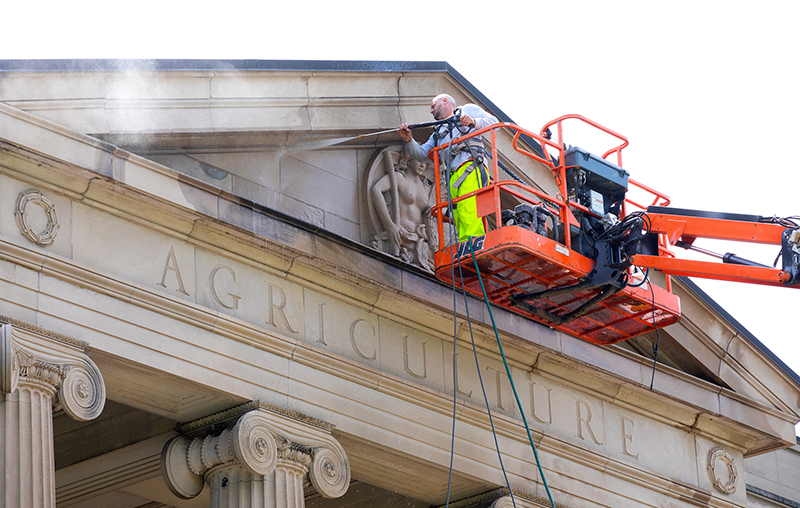
Photo by Christopher Gannon.
Jeff Smith of AJWD, a masonry contractor based in Butler, Illinois, works from a lift to pressure wash the front of Curtiss Hall Monday morning, part of a larger project to renew the exterior of the administrative home of the College of Agriculture and Life Sciences. It includes cleaning the stone and masonry, repairing or replacing cracked and deteriorated stone, tuck-pointing and replacing the building sealant. The work will continue through the summer, restoring more than 30,000 square feet of building surface.
Acclimating 5,700 students to Iowa State
An estimated 5,700 would-be Cyclones -- including 5,300 first-year students -- will visit campus over the next five weeks for new student orientation, a stepping stone in the transition to college student life. Another 1,000 students chose to complete an online orientation experience that includes three to four hours of modules, a math placement assessment and a virtual conversation with their academic advisor before they register for fall classes. All have accepted their admissions offer to Iowa State, though not all have made their final college decision just yet.
Impactful employees
Inside will launch a companion series, Inside Impact, in mid-June that periodically features dedicated employees doing great work. The first one is organized around the unmatched experience employees create at new student orientation.
Daylong sessions on campus for transfer students are May 24 and June 30. Nineteen 1.5-day sessions for first-year students begin daily, Monday-Thursday, from May 31 to June 28 and two Sundays, June 11 and 25. Students will arrive in groups of about 280, with three of the six undergraduate colleges represented each day and colleges further breaking that down into academic programs. New student programs director Sarah Merrill said a cohort structure lets college staffs focus their presentations and students meet more of their fall classmates.
Where will they be?
Orientation students and their families check in at Hixson-Lied Student Success Center on the east side of campus. Those staying overnight on campus will have rooms in Maple Hall, and the adjacent Seasons dining center will be open for breakfast, lunch and dinner. Other ISU Dining venues will offer lunch options.
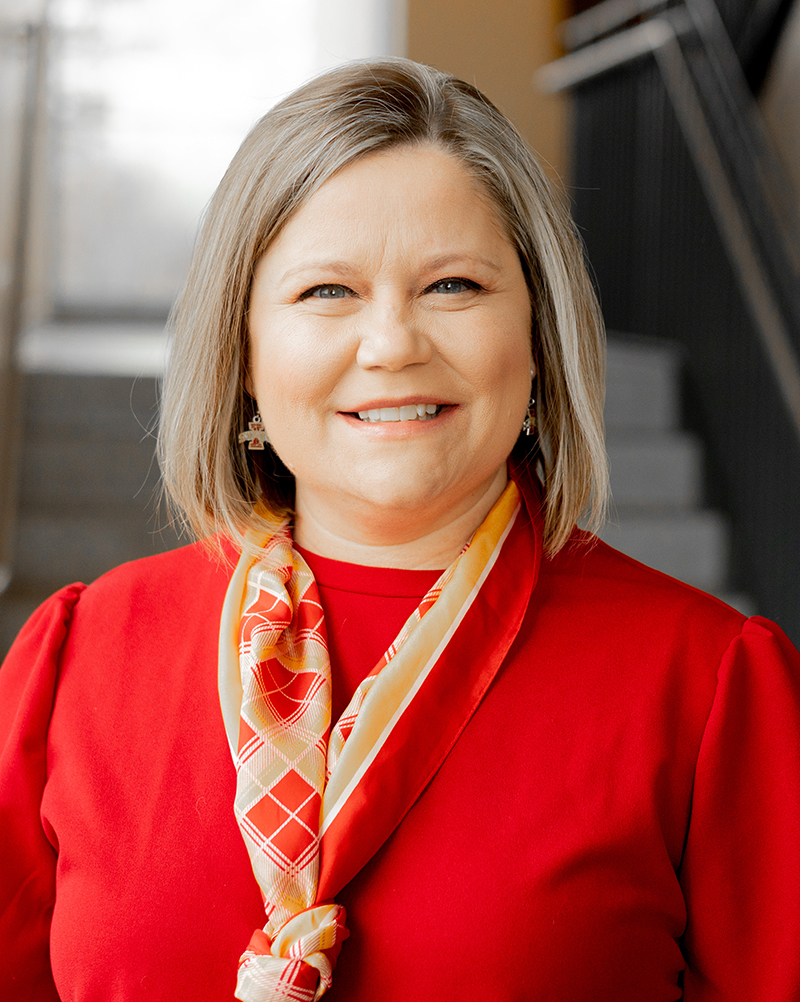
Sarah Merrill
Many of the orientation daytime events will take place in auditoriums, classrooms and offices in buildings rimming central campus, for example, the Memorial Union and Carver, Curtiss and Beardshear halls. The resource fair -- featuring dozens of university departments and offices that support students -- will be held daily (10 a.m.-noon) on floors 1 and 2 of the Student Innovation Center. After dinner, the Lied Recreation Athletic Center is designated for student activities and fellowship.
"At orientation, we focus on those action items we want students to complete before they arrive on campus in the fall," Merrill said. "There are some business things, like turning in their immunization forms, getting their ISUCard and learning how to view and pay their university bill. We also help them better understand their academic degree program before they meet with their academic advisor and register for classes. Our goal is that every student leaves orientation with a course schedule for fall semester.
"Most importantly, orientation is about solidifying their decision to attend Iowa State. We want them to know they can be successful here. So it's about preparing them, socially and academically, for their first semester," she explained. "That includes so many things: What will move-in day look like, how to be a good roommate, where to seek help for your physical health or mental health, what academic support is available to them. All those things play into a successful transition for a new Iowa Stater."
College presentations
3-5 p.m. on Day 1
Agriculture and Life Sciences, 0127 Curtiss
Business, 1148 Gerdin
Design, 0101 Design
Engineering, 2055 Hoover
Human Sciences, 1210 LeBaron
Liberal Arts and Sciences, 1001 Troxel
A Cyclone village
Merrill estimates that 240 employees are involved in each of the on-campus sessions: room schedulers, college presenters, dining staff, academic advisors, resource fair staff and her new student program team, to name a few.
"We roll out the cardinal carpet. Orientation is a true collaboration across academic affairs, student affairs and business and operations," Merrill said. "What makes us unique is that we really do try to be the large university that feels small. We offer students all the resources of a large university, but we also work really hard to provide that individualized, personal support.
"When I travel to conferences, colleagues can't believe what we accomplish at orientation, being a large university," she added.
For example, when leaders recalibrated Iowa State's orientation program after the 2020 pandemic year, one of the things they protected was a personal advising session for each student prior to course registration. That's a commitment that sets Iowa State apart from other large universities, she said.
First-time presenters
Most orientation programming and scheduling mirrors a 2022 event that received a grateful endorsement from its participants. Merrill noted one tweak: ISU police will offer a 30-minute presentation about campus safety every morning. Police chief Michael Newton said a conversation with families fits with the department's history of engaging with community members outside the setting of an incident.
"Building a strong and positive relationship between the police and the community is essential for maintaining public safety and fostering trust. This session will give us a chance to have a first positive interaction with students and their families," he said. "In many cases, people only have contact with police in a time of need, but we want our community to know we want to be there for them -- before we are needed.
"While the ISU police team plays a crucial role in ensuring the safety and security of students on campus, our students also play an essential role. This session will begin bringing them into our community safety efforts," he added.
In the past, ISU police officers participated at the resource fair.
Verify eligible dependents by June 2
Have you verified the dependents on your health care plans yet? The deadline for the verification phase of the dependent eligibility project led by university human resources (UHR) is Friday, June 2. More than 80% of faculty and staff have completed the process.
Employees who do not provide the proper documentation to verify dependents will have ineligible dependents removed from their plans, but no ineligible dependents will lose coverage until next year's plan begins on Jan. 1, 2024. In September, the university will notify employees with ineligible dependents of their removal from benefits enrollment records before open enrollment begins in November. Eligible dependents can be added to plans during open enrollment and any changes to plans will go into effect on the first of the year.
By the numbers
Only 13% of employees -- around 510 people -- have yet to start the process. A majority of employees have submitted documentation and less than 1% of dependents have been identified as ineligible. UHR director of benefits Ed Holland said he feels good about where the project is at with a week left until the deadline.
Dependent eligibility verification update as of May 23
| Verification process | |
| Completed | 81.9% |
| In process | 5.1% |
| Not started | 12.9% |
| Status | |
| Verified eligible | 81.9% |
| Ineligible | 0.6% |
| Verification in process | 3.2% |
| No activity yet | 14.4% |
Few hiccups, overall success
For some (including this writer), the biggest challenge to verifying dependents was reading the directions and submitting the correct documents. Holland said WTW, the consulting firm assisting with the project, addressed incidents like this and other more complex issues such as advising employees about options for translating legal documents.
"I have been extremely pleased with how this has gone and the engagement of our employees in completing the process," he said.
Learn more
For more information about the dependent eligibility verification project, read the March Inside article and visit the UHR website. For assistance submitting documentation or other questions about the process, contact the WTW Dependent Verification Center at 1-855-722-9663 (8 a.m.-5 p.m. CST, Monday-Friday).
Computer science faculty devise a new model for growing graduate enrollment
A revamped creative component and rapid admissions decisions are key pieces of the computer science department's strategy to grow its non-thesis master's degree programs by 100 students over the next three academic years (2023-24 through 2025-26). This spring, the department had 59 students in its master's programs.
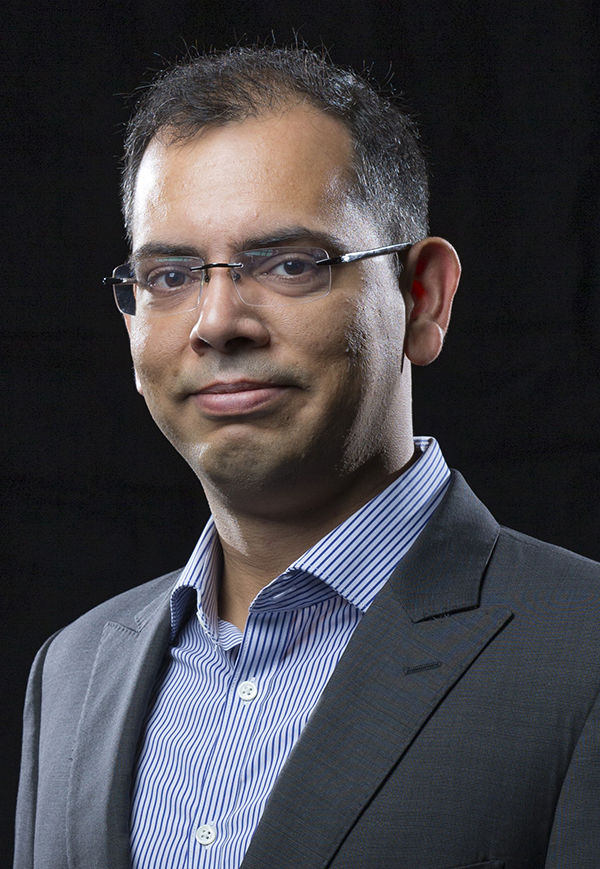
Rajan
Kingland Professor and department chair Hridesh Rajan said demand is high for its two M.S. programs -- computer science and the 2021 addition of artificial intelligence (AI) -- from both prospective students and the employers who want to hire them when they're done. Last year, more than 700 individuals applied for the combined 25 seats.
"Our faculty understand a master of science for a student preparing to join the workforce needs to offer a little different training from the graduate student preparing for a research or academic career," Rajan said. "I'm really very proud of my colleagues for their growth mindset and understanding the importance of finding a new way to provide computing and AI graduates for Iowa and the nation."
As planned, the department will use bridge funds from the provost's office to hire two tenure-track faculty for the first three years of their work. As enrollment climbs, the department will add a third tenure-track faculty position and a staff position to manage admissions and student support.
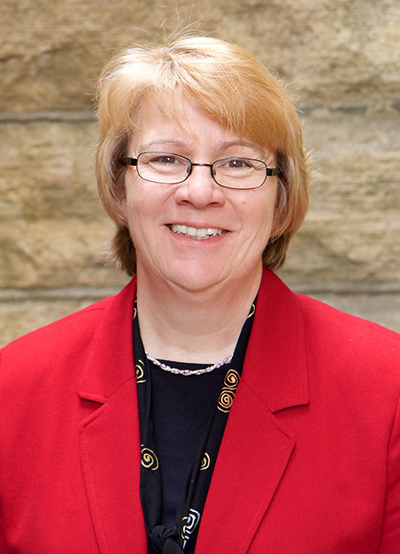
Schmittmann
With 100 additional graduate students paying their way, the program will be self-sufficient, said College of Liberal Arts and Sciences dean Beate Schmittmann. She said the college and department have a revenue-sharing agreement to distribute the added net revenue. The agreement anticipates sustained growth and will be reviewed in four years.
She said computer science's growth plan aligns with "Reimagining LAS," a multiyear effort announced last year to right-size the college by identifying new revenue streams and reducing costs through curriculum and program changes.
"It's also tied to the university priority of expanding graduate enrollments, especially in master's programs, and the department's goal of growing its profile and footprint -- in both faculty and master's students," Schmittmann said.
A model for others
Senior vice president and provost Jonathan Wickert said the computer science department's plan is a model to follow for other master's programs at Iowa State.
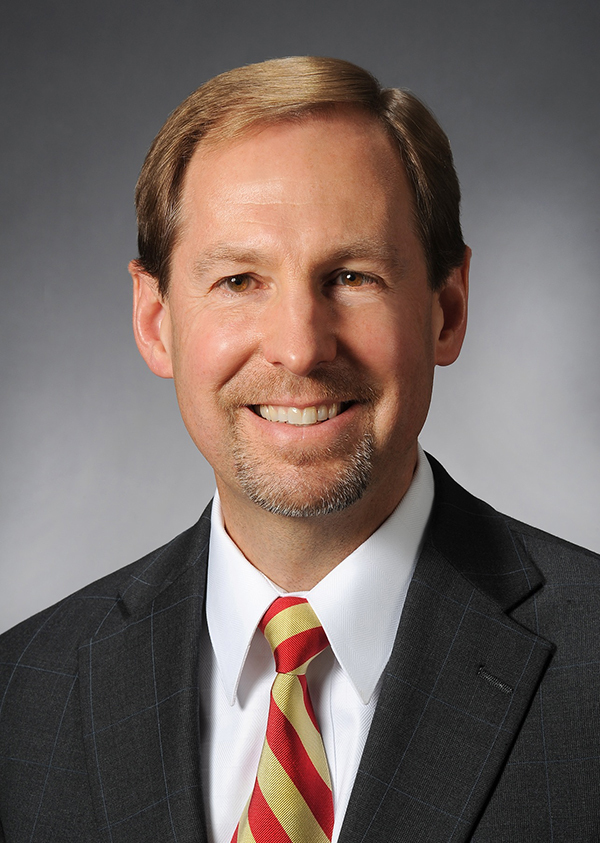
Wickert
"It's an exciting and transparent revenue-sharing plan that rewards success and provides an incentive for the department to grow," he said.
"The department's faculty took action to raise the profile of its programs, with my office providing financial help on the front end so they can begin recruiting immediately," Wickert added. "We hope other graduate programs might find a way to replicate it in a way that works for them.
"Departments and colleges benefit tangibly by offering high-quality, high-demand degree programs and follow up with a focus on student retention and success," he added.
More about computer science's plan
"We're both excited and holding our breath to see what kind of impact this can have," Rajan said. Several factors are key to the success of his department's plan:
1. Creative component reimagined as a capstone project
Faculty modified the creative component for non-research master's students to function like a capstone course, in which a number of students work on a project together following a fixed timeline for deliverables. Faculty also expect to involve industry in the creative component course, helping students build relationships that may prove valuable at graduation time.
"That allows us to scale this to the level we want. A traditional research component -- or even an individually-mentored creative component -- is personnel-intensive and impossible to scale," Rajan said.
2. Quick admissions decisions
The department is committed to fine-tuning its admissions criteria and giving applicants an admissions decision within 10 business days in most cases. This departs from the common "batch-processing" of prospective students every few months. Particularly for international students, who face a tedious and time-consuming immigration process to study in Iowa, quick decisions provide more time to get it done, Rajan noted.
"That determines whether the highest-quality students accept our offer or go elsewhere," he said. "We have a very strong program. If we're the first in their email box to say 'congratulations, you're admitted,' it's likely they will come to Iowa State."
3. Student retention in the non-thesis master's programs
For the model to succeed, the enrollment growth needs to occur among students seeking the creative component master's degree, and students need to complete the program.
"With students paying the cost of their education, the tuition revenue covers the additional positions, and we can scale up enrollment while maintaining reasonable workloads for our current faculty," Schmittmann said.
McDonough joins president's strategic initiatives team
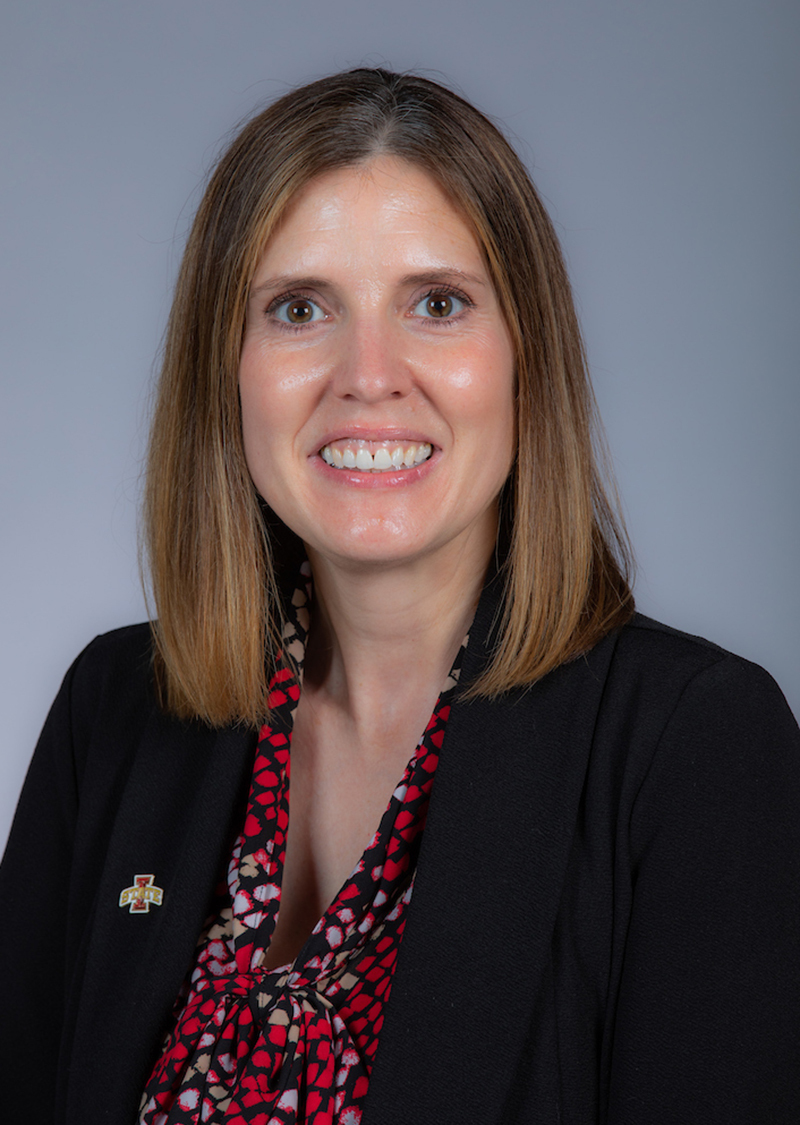
Kim McDonough
Kim McDonough joined the team in the office of the president May 15 in a new position, strategic initiatives project specialist. She reports to senior advisor to the president Sophia Magill and will support implementation of universitywide strategic initiatives including the 2022-31 strategic plan. More specifically, she will provide data and metrics management and analysis to advance strategic priorities -- including those selected through the annual proposal process -- and build and strengthen relationships with campus partners.
McDonough has worked at Iowa State for more than 14 years, most recently as director and then senior director of development for the College of Design (2018-23) and director of alumni relations for the College of Liberal Arts and Sciences (2014-18).
She is a three-time alumna, earning bachelor's and master's degrees in journalism and mass communication, and a doctoral degree in education from Iowa State.
Her office is in 1750 Beardshear. She can be reached by email at kmm@iastate.edu, by phone at 294-3073.
Rec services will go cashless on June 4
Recreation services will become a cashless operation beginning Sunday, June 4, when clients will need to use a credit card for most purchases. The change primarily is to standardize processes for the unit's many student employees and eliminate staff time spent reconciling cash drawers each day.
Rec services' Adventure Program, which includes outdoor equipment rentals and trips and a bike maintenance service, has been cashless for about two years.
With 5% of sales made with cash last year and that figure down to about 3% so far this year, the change won't impact most of its customers, said Ally Kuehl, business operations coordinator for rec services. The majority of cash transactions are for day passes purchased at the service desks in State Gym or Lied Athletic Recreation Center -- for example, a faculty member who runs outdoors during most lunch periods but opts for the Lied track on a frigid February day, or an employee member who brings along a co-worker for a pickleball game after work.
Kuehl said rec services will continue to accept checks for payment of annual memberships and facility rentals from clients who prefer to pay that way.
Rec services is the second university department to announce cash-only transactions. ISU Dining implemented its no-cash plan last week.
Executive board keeps faculty voice present during summer
The Faculty Senate will not convene until September, but that doesn't mean the groundwork for another successful academic year isn't already being laid.
President Sarah Bennett-George, who took the gavel during the May meeting as just the second term faculty president, already has convened with the senate's executive board to discuss important topics the senate may address this fall.
"It was a chance to get to know each other because we have a lot of new members on the executive board, which is great," said Bennett-George, associate teaching professor of apparel, events and hospitality management. "We discussed priorities and what we wanted the senate to do for the faculty."
Bennett-George said she will use the summer to prepare for a productive senate session, which includes the introduction of new courses and degrees despite the catalog freeze.
"People are using the catalog freeze as an opportunity to review their curriculum, and I hope next year they are ready to propose things and continue to help our faculty and students," she said.
Because most faculty have nine-month contracts, the executive board typically doesn't meet over the summer, but that was not the case during the pandemic summers. Executive board members showed their commitment by meeting and working with administration to make decisions to allow campus to function. Bennett-George began on executive board during the height of developing pandemic precautions, a process that showed the importance of Faculty Senate and shared governance.
"I was struck by how much the administration was wanting feedback from faculty about getting through the pandemic and helping faculty and students be successful," she said.
The executive board will meet with President Wendy Wintersteen and senior vice president and provost Jonathan Wickert before the start of the fall semester. It is a traditional meeting that helps set the tone for the academic year and reestablishes open communication between the Faculty Senate and university leaders.
The board
The executive board is made up of the senate officers and college caucus chairs. It is the last stop between the senate councils and the general senate.
"The board reviews the proposals and docket items coming in and then sets the agenda for the regular Faculty Senate meetings," Bennett-George said. "It also entails communication between the board and the provost about various projects to get the faculty view."
Board members also talk with presenters prior to senate meetings to understand the information and help anticipate questions from senators.
Summer guests on campus
It's summertime and campus will buzz with activities, conferences and camps held at Iowa State. Inside compiled a list of events with an anticipated attendance of 100+ guests using ISU facilities. If you don't see your event or know of an event we missed, email inside@iastate.edu.
| Event | Date | Venues | Attendance |
|---|---|---|---|
| Transfer Student Orientation | May 24, June 30 | Various* | 400 students, 550 guests |
| Special Olympics Iowa Summer Games | May 25-27 | Various* | 3,000 |
| Cyclone Country Kennel Club Agility Trials | May 26-28 | Hansen Ag Center | 100 |
| First-Year Student Orientation | May 31-June 28 | Various* | 5,300 students, 8,000 guests |
| Cyclone Football Camps | June 3-22 | Bergstrom Football Complex | 1,000 |
| All Iowa Attack Tournaments: 4th-11th Midwest Girls Classic | June 9-11 | State Gym | 100 teams |
| Goat Show/Cardinal and Gold Showdown | June 10-11 | Hansen Ag Center | 100 |
| USA Hockey 14U Camp | June 11-16 | ISU Ice Arena* | 150 |
| ISU Volleyball Camp: Elite | June 16 | Lied Recreation Center | 120 |
| Cyclone Marching Academy Camp | June 16-17 | State Gym | 250 |
| Youth Track and Field Outdoor Championships | June 17-18 | Various | 1,000 |
| ISU Volleyball Camp: Junior Cyclone | June 19-22 | Lied Recreation Center | 100 |
| Iowa Reading Association Conference | June 20-21 | Scheman Building | 300 |
| All Iowa Attack Summer Prep Shootout | June 23-25 | State Gym | 100 teams |
| ISU Volleyball Camp: Hitter | June 26 | Lied Recreation Center | 120 |
| National Cheerleaders Association Camp | June 26-28 | State Gym* | 150 |
| Iowa 4-H Youth Conference | June 27-29 | Various* | 400 |
| ISU James D. McDean Swine Disease Conference | June 28 | Scheman Building | 280 |
| Iowa Swine Day | June 29 | Scheman Building | 550 |
| ISU Volleyball Camp: Libero/Server/Setter | July 6-7 | Lied Recreation Center | 150 |
| Summer Iowa Games | July 7-16 | Various | 7,000 |
| National Dance Association Camp | July 8-11 | State Gym* | 160 |
| Cyclone Volleyball All Skills Gold Camp | July 11-13 | Lied Recreation Center* | 150 |
| BRAVO! National Midwest Summer Bash | July 11-16 | Stephens Auditorium | 300 |
| Dance Team Union Camp | July 19-21 | State Gym* | 100 |
| RAGBRAI | July 25-26 | Jack Trice Stadium | 50,000 |
*Events also using residence halls.
Venue changes affect parking during this week's Special Olympics
Several thousand athletes, volunteers and spectators will visit campus Thursday-Saturday, May 25-27, for the annual Special Olympics Iowa Summer Games. Campus parking lot closures have been adjusted to accommodate construction projects and venue changes. Expect more traffic in and around the Iowa State Center's north lots.
Check-in for volunteers, athletes and teams moves to the Scheman Building, which also serves as the transportation hub for free shuttle service to most competition venues. The Scheman courtyard will host the Olympic festival activities, sports clinics and food trucks. Souvenir sales and free health screenings for athletes will be available inside Scheman.
The cycling competition will move from the Iowa State Center parking lots to the lots west of the Cyclone Sports Complex, while tennis will move from the Forker courts to the Ames High School sports complex (2005 24th St.).
Beyer Hall (swimming), Lied Recreation Center (track and field), Forker Building (developmental events) and Hilton Coliseum (Thursday night opening ceremony and Friday night dance) again will serve as competition venues, along with the recreation fields east of Lied and Maple Willow Larch (soccer, bocce, track and field). The MWL commons, dining and residence halls also will be open to Special Olympics participants staying overnight.
Road and lot closures
On Thursday and Friday (7:30 a.m.-10 p.m. daily), Beach Road will be closed to through traffic between Lincoln Way and the south driveway to the power plant.
Numerous parking lots will be closed to ISU permit holders during the summer games, including:
-
Lots 61A and 61B (west of Cyclone Sports Complex), Thursday (all day): Closed to all vehicles, designated site for cycling events
-
Lot 6 (west of Sukup Hall), Friday (all day): Reserved for ISU reserved permits and summer games participants with disabled parking permits
-
Lot 7 (west of Thielen Student Health), Friday (all day): Reserved for ISU reserve permits and summer games participants with disabled parking permits
-
Lot 50A (west of Forker), Thursday and Friday (all day): Reserved for ISU reserve permits and summer games participants with disabled parking permits
-
Lot 57 (west of Lied Recreation), Thursday and Friday (all day): Closed to all ISU parking permits, reserved for vehicles with special permits.
-
Lot 100 (south of Lied Recreation), Thursday, Friday and Saturday (all day): Closed to all vehicles, designated site for Special Olympics activities. In addition, some sections of Lot 100 will close Tuesday and Wednesday for event set-up.
-
Additional lot closures for Special Olympics functions or safety considerations, Thursday and Friday (all day): Lots 54, 54A, 56, 63, 66, 67, 80, 82, 83, 89, 90 and 91.
